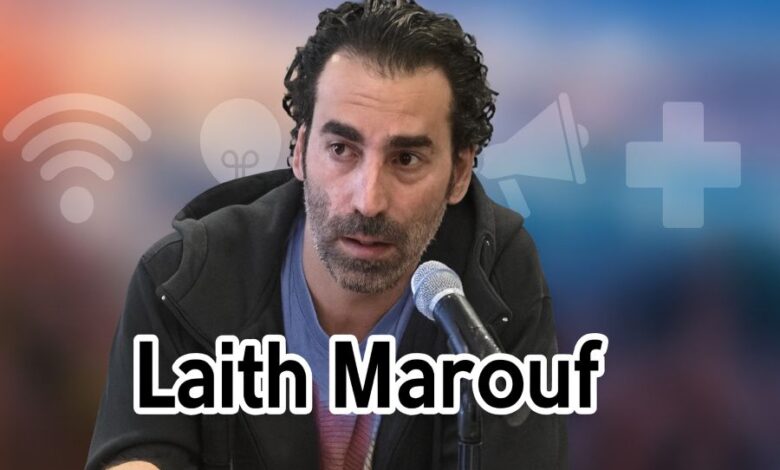Laith Marouf – The Controversial Media Consultant Who Shaped Independent Broadcasting and Stirred Global Debate
From community journalism to global controversy: the story of a man who changed conversations around media, race, and activism.

Introduction
Laith Marouf is a Canadian media consultant, producer, and political commentator known for his long-standing work in community broadcasting and his vocal stance on issues relating to Palestine and media representation. With a career that began in the late 1990s, Marouf has become a figure both praised for his advocacy of marginalized voices and criticized for his divisive statements. His story reflects the complexity of activism in the digital age — where independent journalism, political speech, and controversy intersect in powerful and sometimes conflicting ways.
Marouf’s influence extends across community media, television, and radio platforms, where he has worked to amplify underrepresented communities and challenge dominant narratives. Yet, his journey has also been marked by intense public scrutiny, particularly following a major controversy that reshaped how governments and organizations approach anti-racism funding.
Quick Bio
| Attribute | Details |
|---|---|
| Full Name | Laith Marouf |
| Nationality | Canadian |
| Profession | Media Consultant, Journalist, Political Commentator |
| Known For | Community Media Advocacy, Pro-Palestinian Activism |
| Organization | Community Media Advocacy Centre (CMAC) |
| Career Start | 1999 |
| Awards | NCRA Best Special Programming, ACTRA Award, Community Media Convergence Awards |
| Controversy | Anti-racism funding dispute (2022) |
| Current Work | Independent media commentary and production |
Early Career and Media Journey
Passion for Independent Media
Laith Marouf began his journey in media around 1999, focusing on community-driven journalism and grassroots broadcasting. His passion was to create accessible media spaces for those often ignored by mainstream outlets. Through his early projects, he helped shape the foundation for independent media networks that prioritized diversity, equity, and social justice.
His commitment to independent broadcasting became evident with the creation of Under the Olive Tree, a radio program aired on Montreal’s CKUT and Kingston’s CFRC between 2005 and 2010. The show centered around the Palestinian cause and the broader struggles of displaced communities. Marouf’s work on this platform earned him recognition for giving a voice to the voiceless.
The Rise of Community Media Leadership
Marouf’s leadership flourished when he became the Executive Director of Community University Television (CUTV) in Montreal. Between 2010 and 2013, he helped the channel transition into a live broadcasting platform that covered significant social movements — particularly the Quebec student protests, also known as the “Maple Spring.”
His innovative approach to coverage — involving real-time citizen participation and grassroots reporting — gained national attention. His work demonstrated how digital tools could empower community storytelling and challenge traditional broadcast hierarchies.
Awards and Achievements
Recognition for Broadcasting Excellence
Throughout his career, Laith Marouf received multiple awards acknowledging his contribution to community media. Among them was the Best Special Programming Award from the National Campus and Community Radio Association for a 12-hour live broadcast titled Radio Free Palestine in 2008.
He also received the Outside-the-Box Award from the Community Media Convergence in 2015, recognizing his creative approach to live, interactive, and socially conscious media production. His 2012 coverage of the Quebec Maple Spring movement earned both the Audience Choice Award and an ACTRA Community Engagement Award, cementing his reputation as a leader in participatory broadcasting.
The CMAC Role and Federal Controversy
Senior Consultant and Government Funding
Marouf later served as a senior consultant at the Community Media Advocacy Centre (CMAC) — an organization aimed at improving media access for Indigenous and racialized communities in Canada. Under his guidance, CMAC received significant funding from the Canadian government’s Anti-Racism Action Program in 2022 to conduct training and awareness programs.
However, this success turned into a nationwide controversy when Marouf’s social media statements were condemned as anti-Semitic and hateful. The incident prompted public backlash and led to the federal government terminating CMAC’s funding agreement. The Canadian Heritage Department later confirmed it was working to recover the funds and reassess vetting procedures for similar grants.
Impact and Public Reaction
The fallout from this controversy was immediate and intense. Many activists defended Marouf’s right to free speech, arguing that his comments had been misrepresented, while others condemned them as unacceptable and divisive. The event sparked a national debate on the limits of free expression, accountability in activism, and government oversight of publicly funded programs.
The “Laith Marouf case” has since been cited as an example in discussions about public funding transparency and anti-racism policy. It also highlighted how social media can both amplify and destroy reputations in an age where every statement carries global reach.
Recent Activities and Media Presence
Continuing Work in Media Production
Despite the controversy, Laith Marouf continues to work in independent media. He produces and participates in digital talk shows such as Wartime Café, a program that discusses current geopolitical and regional issues with a focus on the Middle East. His ongoing commentary reflects his continued engagement with themes of resistance, imperialism, and communication rights.
In 2025, reports indicated that Marouf faced legal issues in Lebanon, where he was reportedly detained and later released. He remains active in online discussions and maintains an audience that follows his perspectives on Palestine, international relations, and Western media narratives.
Career Overview and Legacy
Influence on Community Broadcasting
Laith Marouf’s influence on Canadian community broadcasting is undeniable. His innovative approach to live and interactive media allowed ordinary citizens to take part in national conversations. His work inspired a new generation of media producers who prioritize community involvement and political awareness.
At the same time, his public controversies exposed the delicate balance between activism and accountability. He became a symbol of both the power and the risk of unfiltered expression in an era where social media blurs the line between journalism and personal commentary.
Enduring Legacy
Regardless of differing opinions, Marouf’s story remains an essential part of Canada’s media and activism landscape. His achievements in community journalism, combined with his role in one of the country’s most publicized funding disputes, continue to shape conversations about the role of speech, power, and representation in public life.
Conclusion
Laith Marouf’s career is a study in contrasts — a journey marked by creative innovation, social advocacy, and polarizing controversy. His influence in shaping community media in Canada is undeniable, yet his legacy is shadowed by the fierce debates surrounding his online expressions.
Through both his accomplishments and his controversies, Marouf stands as a reminder that the path of activism is complex, and that freedom of speech, when intersected with public responsibility, remains one of the most challenging balances in modern society.
Frequently Asked Questions (FAQ)
Q1: Who is Laith Marouf?
Laith Marouf is a Canadian media consultant and activist known for his work in community broadcasting and pro-Palestinian advocacy.
Q2: What organization was he involved with?
He served as a senior consultant for the Community Media Advocacy Centre (CMAC).
Q3: What was the main controversy surrounding him?
In 2022, his social media remarks sparked accusations of antisemitism, leading to government funding cuts to CMAC.
Q4: What are some of his notable achievements?
He won awards from the National Community Campus Radio Association, ACTRA, and Community Media Convergence for innovative community broadcasting.
Q5: What is his current occupation?
He continues to produce and comment on media and geopolitical affairs through online programs such as Wartime Café.
Q6: How is his legacy viewed today?
His legacy remains mixed — respected for advancing independent media but criticized for remarks that ignited a national debate on hate speech and free expression.



